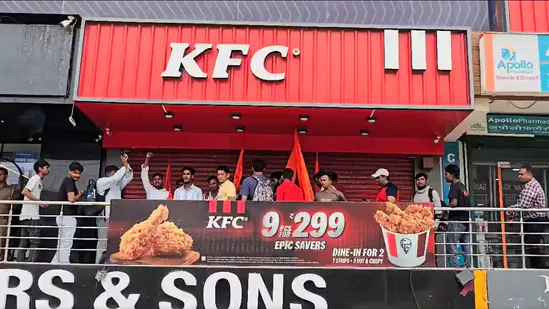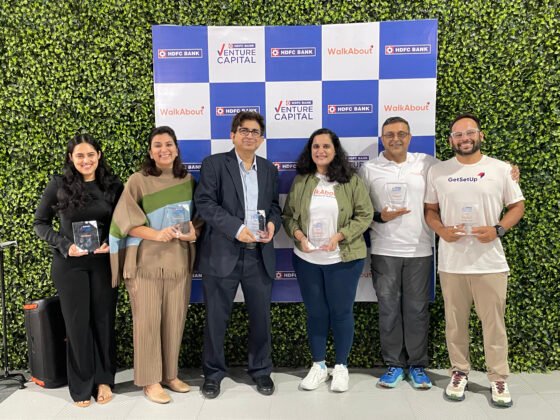
What if KFC preserving India’s soul meant saying no to chicken wings and mutton kebabs?
That’s not just a rhetorical question anymore. In July 2025, the people of Vasundhara, Ghaziabad answered it with action. During the sacred month of Sawan — a time of fasting, worship, and the holy Kanwar Yatra — several local residents and members of the Hindu Raksha Dal approached meat-serving outlets like KFC and Nazir Foods and demanded they shut shop or go fully vegetarian. No government order, no court ruling — just the power of cultural sentiment made visible.
Videos showed chants of “Har Har Mahadev” and “Jai Shri Ram” as shutters rolled down. Protestors told NDTV that serving meat during Sawan in a Hindu-majority residential colony was unacceptable. One said, “This is a Hindu area. You cannot sell meat here during our holy month.”
Despite there being no official ban, both KFC and Nazir’s complied. The KFC outlet manager Nikita Rana, speaking to Economic Times, reported a 70% drop in footfall after temporarily switching to a vegetarian-only menu. Nazir Foods shut for nearly five hours. Police arrived later, with ACP Abhishek Srivastav confirming that no law was broken by the restaurants, and the outlet wasn’t even on the official Kanwar Yatra route. An FIR was filed under public order violations, but the symbolic victory was already won — the public had redrawn the boundary between faith and food.
The Real Irony: When Citizens Say Stop, But the State Says Sell
What unfolded wasn’t just a cultural protest — it exposed a contradiction sitting at the core of India’s governance. While the public defends dharma in the streets, the state builds its economy on buffalo meat exports.
- India exported over 1.26 million metric tonnes of buffalo meat in 2022–23, valued at $3.3 billion.
- Uttar Pradesh alone contributed nearly 60% of this.
- The same government that promotes temple tourism in Ayodhya also supports meat parks in Unnao and Meerut under its ODOP scheme.
- Buffalo meat — which is classified as beef in global trade — remains a key export, especially to Egypt, Vietnam, Malaysia, and the Gulf.
So while devotees fast and walk barefoot to Shiva shrines, foreign buyers feast on what Bharat exports — sometimes from the very districts where those pilgrims live.
Political Hypocrisy: Meat on Paper, Morality on the Mic
Across party lines, politicians speak the language of dharma but draft the economics of slaughter. The contradiction is bipartisan.
CM Yogi Adityanath, known for promoting vegetarianism and strict cow protection laws, presides over a government that facilitates UP’s dominance in buffalo meat exports. Under his rule:
- Meat-processing hubs have been modernized and subsidized.
- Leather-linked tanneries (a byproduct of slaughter) have been incentivized.
- New slaughterhouse licenses have continued quietly — even as the rhetoric remains overtly spiritual.
But the BJP isn’t alone. Under Congress, the modernization of abattoirs was pushed aggressively under the National Livestock Mission. Samajwadi Party, in the name of rural upliftment, promoted meat exports in districts like Rampur and Bareilly, while also seeking Muslim vote banks
Key Facts at a Glance
- KFC reported 70% sales loss during temporary vegetarian operations.
- Police acknowledged no legal violation by the restaurants, but still filed FIRs under BNS and BNSS.
- Over 1,500 street vendors across NCR also stopped selling meat voluntarily during Sawan (TOI).
Beyond Ghaziabad: A National Shift in Sentiment?
This is not an isolated event. Across India, religious towns like Mathura, Haridwar, Vrindavan, and Ayodhya have enforced bans on meat and liquor. In Gujarat, many housing societies have long practiced vegetarian-only community rules. During Navratri, meat shops routinely shut across North India — either by policy or by public will.
This Is Not Just About Chicken
This is about who defines Indian streets — those fasting or those frying?
It’s about whether faith ends at the temple gate or shapes public life.
It’s about how far communities must go when governments outsource morality to markets.
And the public is speaking:
- No more biryani stalls next to temples during Sawan.
- No more silence when food habits mock spiritual seasons.
- No more double standards between speeches and slaughterhouses.
Vasundhara Didn’t Shut Down Meat — It Woke Up Bharat
What happened in Ghaziabad wasn’t illegal. But it was intentional.
It didn’t need a circular. It only needed conscience.
Vasundhara was that defiance. And it echoed across India.
FOR MORE BLOGS – beyondthepunchlines.com

 Add to favorites
Add to favorites






